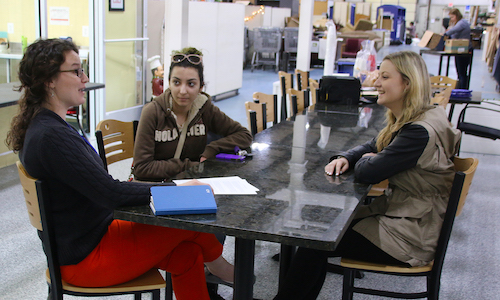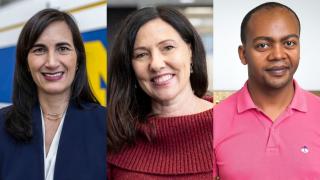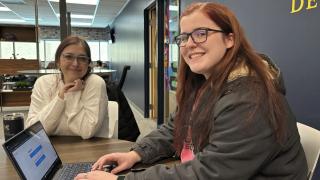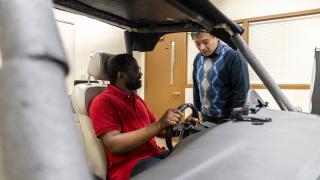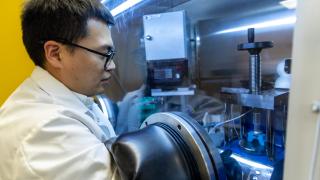More than a decade ago, Composition and Rhetoric Professor Bill DeGenaro created a civic literacy course with the goal to have students go into the community and apply what they learned in class to help others.
The College of Arts, Sciences, and Letters faculty member wanted students to see how reading and writing is more than something done for leisure or for classwork. It’s something that—if done right—can create change.
“Community organizers, activists and everyday citizens use rhetoric in order to advocate and affect social change. I want our students to understand how this works by studying texts and concepts carefully, using rhetorical analysis as a mode of critical thinking; then have them go out into the community and use what they’ve learned,” DeGenaro said of the COMP 364:Writing for Civic Literacy course. “It’s important to learn how to critically process information and use language to become more active, well-informed citizens.”
Assisting nonprofit organization Zaman International: Hope for Humanity in the creation of a blog, junior Ursula Fuller is gathering research to show the community need for Zaman’s Literacy Training Program, which offers the opportunity to help break the cycle of poverty by teaching English language literacy through an English as a Second Language program focused on helping the immigrant and refugee population.
On her laptop, Fuller typed numbers 47 and 41.
That is, 47 percent of people in Detroit are classified as functionally illiterate adults. And Michigan’s national fourth-grade reading performance ranking is 41, just nine from the bottom. They weren’t statistics she was expecting to see. But—through the class, which is an academic service learning course—she hopes her research and writing can help change that.
“This is more than creating a blog that is easy to read. This is taking very serious issues—poverty, food insecurity, inability to read and write—and creating something that will help the audience better understand the issues we have right here at home,” said Fuller, who is one of four students working on the blog; another student group is writing volunteer-based printed materials for Zaman International. “Maybe if more people knew, more people would help.”
Additionally, some class members are working with the Downriver Delta Community Development Corporation in River Rouge, and with the CASL Department of Language, Culture, and Communication in support of the Panel of Immigration and Social Justice event.
In the course, students discuss materials like Henry Thoreau’s “Civil Disobedience” when examining the public sphere and citizenship, Martin Luther King Jr.’s “Letter From a Birmingham Jail” when looking at forms of civic engagement, and Nomy Lamm’s “It’s a Big Fat Revolution” when addressing activism and advocacy. Students also explore the types of media—oral speeches, web-based communication, op-ed pieces, performance art—that can be used to deliver information.
“Today we have myriad ways to share messages. And we all have things to say—maybe about the directions the culture is taking, maybe about things we need to do to strengthen our communities—but we don’t always know how or where to say it,” DeGenaro said. “Writing for real audiences is an effective way to gain these skills.”
Zaman International Department of Community Engagement’s Volunteer Coordinator Abigail DeMars said with their planned website re-launch over the summer and volunteer recruiting efforts for their recently expanded services, the blog fits well with the organization’s direction. She said the work the Writing for Civic Literacy students are doing will help Zaman with outreach efforts.
“Working in the community, we know anecdotally the issues people face. But we didn’t have all the facts and figures we needed to back up the compelling stories that we have,” DeMars said about Zaman’s services, which include a food pantry, a job skills program, a voucher-based clothing and furniture shop and more. “These students have a big role in helping us get the word out and showing the data is there to back up our outreach efforts and mission, which will hopefully lead to additional awareness, support and more people connecting to services they need.”
And, for Fuller, the importance of community engagement is the lasting lesson.
“I took this class because we’d get to actively do something out of the classroom, but didn’t realize how good it would feel to do a project like this,” she said. “This is our community, these are our neighbors. I’m glad I can use my voice to help get the word out.”

